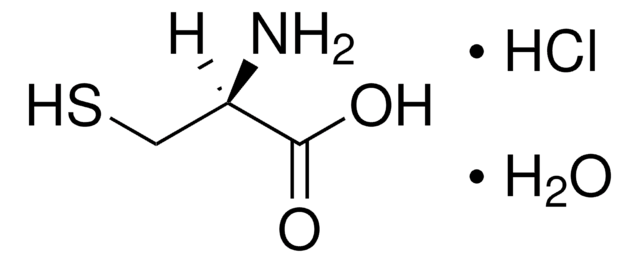778451
L-Cysteine hydrochloride monohydrate
Produced by Wacker Chemie AG, Burghausen, Germany, Life Science, 98.5-101.0%
Synonym(s):
Cysteine hydrochloride monohydrate, Cysteine monohydrate hydrochloride
About This Item
Recommended Products
grade
Produced by Wacker Chemie AG, Burghausen, Germany, Life Science
Quality Level
Assay
98.5-101.0%
form
powder or crystals
optical activity
[α]/D 5.7 to 6.8°
reaction suitability
reaction type: solution phase peptide synthesis
impurities
≤0.2% any ninhydrin positive substance each (total ≤1.0%)
≤0.5% ninhydrin positive substances: impurity A
≤200 ppm ammonium
ign. residue
≤0.1%
loss
8-12% loss on drying
solubility
water: 100 mg/mL at 25 °C
anion traces
sulfate (SO42-): ≤0.030%
cation traces
Fe: ≤10 ppm
suitability
clear, colorless for appearance of solution
application(s)
peptide synthesis
SMILES string
O.Cl.N[C@@H](CS)C(O)=O
InChI
1S/C3H7NO2S.ClH.H2O/c4-2(1-7)3(5)6;;/h2,7H,1,4H2,(H,5,6);1H;1H2/t2-;;/m0../s1
InChI key
QIJRTFXNRTXDIP-JIZZDEOASA-N
Looking for similar products? Visit Product Comparison Guide
General description
Application
Biochem/physiol Actions
Legal Information
Storage Class Code
11 - Combustible Solids
WGK
WGK 1
Flash Point(F)
Not applicable
Flash Point(C)
Not applicable
Regulatory Listings
Regulatory Listings are mainly provided for chemical products. Only limited information can be provided here for non-chemical products. No entry means none of the components are listed. It is the user’s obligation to ensure the safe and legal use of the product.
JAN Code
778451-1KG:
778451-VAR:
778451-100G:
778451-BULK:
778451-25KG:
Choose from one of the most recent versions:
Already Own This Product?
Find documentation for the products that you have recently purchased in the Document Library.
Customers Also Viewed
Our team of scientists has experience in all areas of research including Life Science, Material Science, Chemical Synthesis, Chromatography, Analytical and many others.
Contact Technical Service





